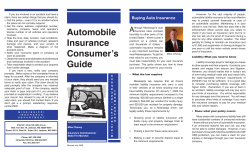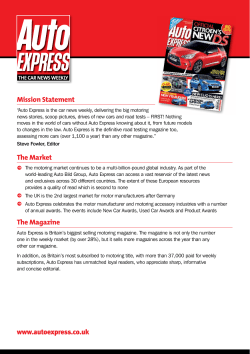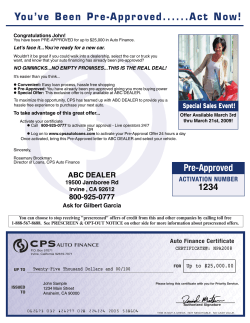
Auto Insurance A Consumer’s Guide to: Choosing and using your auto insurance coverage
A Consumer’s Guide to: Auto Insurance Choosing and using your auto insurance coverage Washington State Office of the Insurance Commissioner Washington Statewww.insurance.wa.gov Office of the Insurance Commissioner Dear auto insurance consumer: Auto insurance is one of the most personal kinds of coverage we purchase. Yet my office receives more complaints about auto insurance than any other type of coverage. While we are able to solve many of those problems, complaints too often involve discrepancies between what consumers thought they were buying and the actual coverage they receive. This guide will help you understand how auto insurance works and what coverage is right for you. The Office of the Insurance Commissioner (OIC) publishes additional guides, fact sheets and other information to educate and assist consumers. All are available on the OIC’s Web site at: www.insurance.wa.gov under “Types of insurance.” Also, if you need help with an insurance problem, or want to file a complaint, call our Insurance Consumer Hotline toll free at 1-800-562-6900. We’re here to help you. Sincerely, Mike Kreidler Washington State Insurance Commissioner Washington State Office of the Insurance Commissioner 1 Understanding your auto insurance policy Your insurance policy is a contract between you and your insurance company. It spells out exactly what the company agrees to do in exchange for the premium that you pay. This contract is divided into two sections: a declarations page and the policy itself. The declarations page This section of the policy includes basic details of the agreement. It is important that you review this page to make sure all the information is correct and all the coverages you requested are included. The declarations page includes: Name of the insurance company Name(s) of the policyholder(s) Policy number The policy The second part of your insurance contract is the policy itself. This includes: Insuring agreement Definitions When and where coverage applies Conditions if the vehicle is financed General conditions Policy period Description of the vehicle(s) insured Coverages purchased Mutual conditions Exceptions and endorsements of the policy Limits of liability and deductibles purchased Premium charge for each coverage List of forms that are a part of the policy Make sure you review your declarations page to verify that your policy includes the types and amounts of coverage you requested. Washington State Office of the Insurance Commissioner 2 Types of coverage There are many different types of coverages available to meet your auto insurance needs. Some are required and some are optional. Here are brief descriptions of the available coverages: Liability Emergency road service Washington state requires liability coverage. This This covers towing when your car breaks down. covers bodily injury and damage to property that you Car rental expense cause to others while using your car. If you have a claim that is covered under your auto Personal injury protection policy, this coverage pays to rent a car. Be sure to This covers a limited amount of medical and hospital check your policy for any limitations. costs, income continuation, funeral expenses, and Death, dismemberment and loss loss of services. Coverage limits are defined in the policy. of sight Medical payments This covers medical and funeral expenses (not all companies offer this coverage). Uninsured/underinsured motorist bodily injury This covers injuries an uninsured or underinsured driver causes to an insured person. Uninsured/underinsured motorist property damage This covers property damage an uninsured or underinsured driver causes to your insured vehicle. Collision coverage This pays for death and certain injuries to people named in your policy due to an auto accident. GAP coverage In the event your vehicle is a total loss, this pays the difference between the current market value of your auto and the amount you still owe the lender. Custom equipment coverage This covers direct and accidental loss to custom furnishings or equipment. Many companies also offer other endorsements (additional coverage). Ask your insurance agent or broker about: • Trailer/camper body coverage This covers damage to your car that is caused by a collision. • Snowmobile coverage Comprehensive coverage (other than collision) • Joint ownership coverage • Limited Mexico coverage • Auto loan/lease coverage This covers damage to your car -- except by collision. For example, this covers your car if a tree falls on it Remember to check your declarations page to or someone vandalizes it. verify the coverage you purchased. Washington State Office of the Insurance Commissioner 3 Shopping for automobile insurance Many insurers offer auto insurance in Washington state. Under state law, insurers may consider your age, driving record, where you live, credit history, and other factors to decide if they will offer you coverage. Not every insurer will offer you coverage. If an agent or broker is unable to find coverage for you, it doesn’t mean that there isn’t an insurer willing to cover you. No single agent or broker will have access to all auto insurers doing business in Washington state. There are three segments of the auto insurance market you should know about: Preferred market -- This market features the lowest premiums and it is available to lowrisk drivers with exceptional driving records. Standard market -- This market refers to the average driver who uses family-type cars and has a reasonably good driving record. Non-standard market -- This market includes young drivers with less experience, drivers with multiple tickets or accidents, and drivers with reckless or drunk driving histories. Most insurers offer coverage that falls into the standard or the preferred markets. A few corporations have several companies within their group and establish tiers that range from the preferred market to the non-standard market. We cannot recommend or suggest specific companies, but we can offer tips to help you shop for auto insurance. Regardless of how you shop or whose services you choose, it is important to do your homework in advance. You should: • Know what types and limits of coverage you need. • Ensure you’re dealing with an authorized company and a licensed agent or broker. • Make sure you have the make, model and other details of the vehicle you wish to insure. • Answer any questions about your driving record and accident history fully and accurately. • Shop for customer service and price. Agents and brokers selling insurance in Washington must be licensed with our agency. We regulate nearly 85,000 licensees. Some are employed exclusively by a specific insurer, while others work independently. You can find agents and brokers: • in the Yellow Pages of your local phone book • through referrals from friends and family • on the Internet Insurance can be a sophisticated product. You need to do your homework and shop the market, regardless of whether you buy in the traditional manner or online. Washington State Office of the Insurance Commissioner 4 What to do if you can’t find auto coverage Some drivers have a hard time obtaining insurance. This can result from a number of factors, including a poor driving record, type of vehicle, claims history, experience, etc. There are insurance companies that write nonstandard policies in this state. They include: • Allstate • Dairyland • Farmers • Financial Indemnity • Guaranty National • Infinity • Leader • Nationwide • Progressive • Safeco • Viking Insurance Company of Wisconsin If your driving record prevents you from obtaining a policy in the non-standard market, your agent or broker will contact the Automobile Insurance Plan on your behalf. More than 55 years ago, the Washington State Legislature created this plan to provide auto insurance coverage to high-risk drivers who are unable to find coverage. To qualify for this special coverage, you must: • Be a Washington state resident or a member of the U.S. military • Hold a valid Washington state driver’s license • Not have any debt from previous auto insurance coverage The cost of auto insurance Auto insurance cost is a major concern to Washington’s drivers. Insurance companies must submit their rate requests to our agency for review. These requests must include enough financial information (actuarialbased) to verify the need for the requested rate. If we are satisfied with the rate information, we must approve the request. Insurance companies can rate all licensed drivers in the household -- the policyholder and his or her spouse, and other household members, whether or not they are related by blood. This includes roommates. As a result, insurers generally base their premiums on all household members. Insurance companies base auto rates on a variety of factors. The premium you pay consists of a “base rate.” The base rate is adjusted based on factors such as your age, sex, marital status, driving pattern, claims history, location, credit history, and the make, model and year of your vehicle. When you shop for auto insurance, remember that each company uses these factors differently. Age Statistics show drivers under the age of 25 have more accidents than adults between age 25 and 65. As a result, insurers charge young drivers and families with young drivers in the household higher rates. Statistics also show that senior citizens are more likely to be involved in an accident. Washington State Office of the Insurance Commissioner 5 Gender Driving patterns Young men under the age of 25 are involved in more accidents per miles driven than any other population group. Washington state law allows insurance companies to charge based on gender and age when statistics indicate a greater risk. The number of miles you drive per year can increase your rates. For example, if you drive a total of 7,000 miles in a year, you will normally pay lower rates than if you drive 15,000 miles in a year. Insurance companies consider the distance you commute to work as additional miles you add to your noncommuting, “pleasure” miles. Marital status Statistically, married couples have fewer accidents than singles and generally pay lower rates. Vehicle type Generally, the more expensive your vehicle, the more you will pay for comprehensive and collision coverage. Also, because sports cars and highperformance cars are involved in more accidents, cost more to repair, and are stolen more often, they cost more to insure. Location A higher number of accidents in a highly populated area will raise both liability and collision premiums. Higher crime rates in urban areas can also raise premiums for comprehensive coverage. The law also allows companies to base your rates on your address (where you keep your car), even though you may drive to a more urban or rural area. Driving record and claims history Most companies apply a surcharge to drivers involved in an accident or convicted of multiple traffic violations. Likewise, the more claims you file, the more likely your rates will increase. Credit history Under federal law (Fair Credit Reporting Act), insurance companies can use credit history as one factor that impacts your auto rate. They may assign you an insurance score based on your credit history. They use your score as one factor to decide whether to accept or decline your coverage, or how much to charge you. However, the Insurance Commissioner believes that the use of credit information in insurance is inherently unfair and in 2002, he requested a bill to limit its use. The law limits the use of certain information in credit scoring. For more information, check out our section on credit scoring on the Web at: http://www.insurance.wa.gov/ consumers/credit/index.shtml. Companies differ in the skill, care and speed with which they settle customers’ claims. The OIC cannot recommend one company or policy over another. Washington State Office of the Insurance Commissioner 6 How to reduce your rates Here are several options for saving money on auto insurance while making sure that you have adequate coverage: Each insurance company has unique financial goals and costs. As a result, it isn’t uncommon to find rate differences between companies for the exact same coverage. The cheapest insurance may not provide you with the degree of coverage you need. It is a good idea to discuss your coverage with your agent or insurance company. companies will give you a discount on your auto premiums if you also insure your house through the same company. Insurance companies are required by state law to give discounts to seniors, age 55 and older, who complete safe driving courses. For a list of courses, visit the Washington State Department of Licensing at: http://www.dol.wa.gov/ driverslicense/seniors.html. Select the right car Eliminate duplication The type of auto you own has a direct influence on your insurance costs. Before you buy an auto, check with your agent or broker to find out how much it will cost to insure. Your coverage may overlap in some areas, such as medical, collision, and uninsured motorist property damage. Ask your agent or broker to explain your coverage and advise you if you are duplicating coverage. Shop around Select higher deductibles The amount of the deductible you select will affect your auto rate. For example, you may save money by increasing your collision and comprehensive deductibles from $100 to $500. To help keep your premiums down, you may want to think about paying for smaller claims yourself and using your insurance to only pay for larger claims. Special discounts Ask each agent or company if they offer special discounts. They often offer discounts to young drivers who are good students or who have completed a driver’s education course. Many Buying collision/comprehensive coverage If you don’t think you could afford to fix your car yourself if it was involved in an accident, you may want to carry collision and comprehensive coverage. These coverages protect owners of expensive and late-model autos against the cost of repairs. Though coverage may increase your rates, you may want to think about it if the difference in what you pay would exceed your ability to pay the repair bills. Your lender may require these coverages until you’ve paid off your car. Washington State Office of the Insurance Commissioner 7 Additional information Coverage for home health What you should do after care workers an accident If you are a health care worker and you use your own auto to occasionally take clients to their appointments, it may impact your coverage. Insurance policies vary from company to company. Always check the coverage and exclusions in your insurance policy. If you still are unsure about what uses your policy covers, contact your agent or insurance company. For more information on home health care workers, check out our auto section on the Web at: http://www.insurance.wa.gov/ consumers/auto/index.shtml. Auto service contracts Auto service contracts extend and expand your car’s original warranty. Effective Oct. 1, 2006, the company issuing the service contract must be registered with the Office of Insurance Commissioner. Service contracts must be backed by an authorized insurance company. The warranty contract must clearly identify the insurance company and the company that’s promising to repair your vehicle (vehicle service contract provider) and how to contact them. You have a right to deal with the insurance company directly. Every driver involved in an accident is legally required to remain at the scene. He or she must also offer aid and give necessary information to others involved and to law enforcement officers. If you’re involved in an accident: • Use all means possible to warn oncoming traffic of the danger at the scene. • Give reasonable aid to the injured. Do not move them unless it is absolutely necessary. • Notify the Washington State Patrol (WSP), city police or county sheriff, and if needed, request a doctor or aid unit and ambulance. • Obtain and give necessary information for the accident report, including names of witnesses and police officers. • If there is any injury or death, or if property damage exceeds $700 to any one person’s property, you must notify the WSP, city police or county sheriff. If you fail to complete a written report, when required, it may result in the suspension of your driver’s license or instruction permit. It is equally important that you promptly report the incident to your insurance company. Also, you may be subject to other reporting requirements specified in your insurance policy. It is vital that you read your policy and know what you must do to file a claim. Washington State Office of the Insurance Commissioner 8 More information and publications For more information about auto insurance, check out our auto section on the Web at: http://www.insurance.wa.gov/consumers/auto/index.shtml Find information on • Private passenger auto insurance company complaints • A consumer’s guide to buying auto insurance (PDF) • Personal injury protection (PIP) insurance • Gap insurance • Understanding how insurance companies determine auto rates • Mandatory auto insurance law • Auto coverage and home health workers Filing an auto claim? • Vehicle total loss • How insurers should calculate taxes and fees when settling total loss claims • Subrogation and your rights Washington State Office of the Insurance Commissioner 9 Need more help? Call our Insurance Consumer Hotline! 1-800-562-6900 Our professional consumer advocates enforce insurance law and can investigate complaints against insurance companies and agents on your behalf. We also offer individual counseling and group education on health care issues in your communities. Our highly trained Statewide Health Insurance Benefits Advisors (SHIBA) HelpLine volunteers can help you understand your rights and options regarding health care coverage, prescription drugs, government programs, and more. Washington State Office of the Insurance Commissioner Call our Insurance Consumer Hotline 1-800-562-6900 See inside back cover for details 2057-OIC-Guide-Auto Insurance-EN-rev. 12/09-Web only
© Copyright 2025












